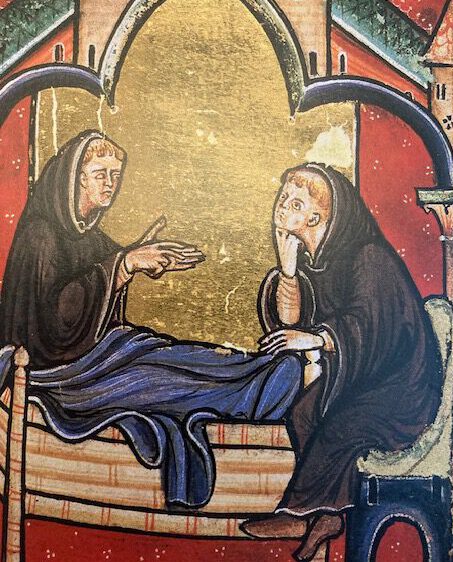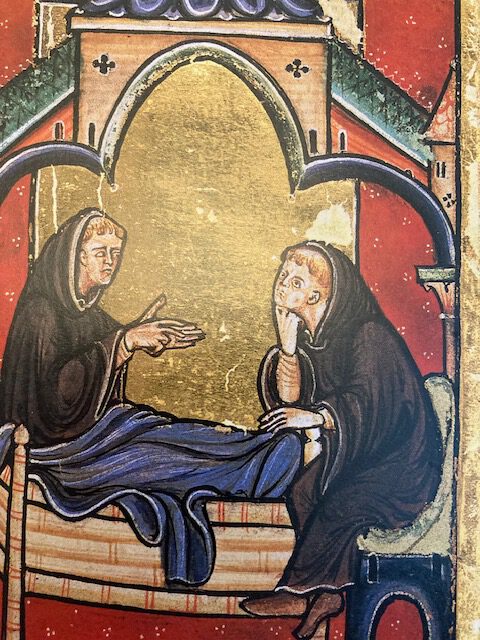Friendship: Bede’s Life of Cuthbert: VIII
I think this is my favourite of all the illustrations. It shows Cuthbert sitting on Boisil’s sick bed, perhaps warming his feet to comfort him. They are clearly engrossed in conversation, intent on the Gospel they are discussing, Boisil gesticulating with his hands. It is relaxed and homely and full of attention and affection.
HOW CUTHBERT WAS RECOVERED FROM SICKNESS, AND BOISIL, ON HIS DEATH-BED, FORETOLD TO HIM HIS FUTURE FORTUNES

MEANWHILE, as every thing in this world is frail and fluctuating, like the sea when a storm comes on, the above-named Abbot Eata, with Cuthbert and the other brethren, were expelled from their residence, and the monastery given to others. But our worthy champion of Christ did not by reason of his change of place relax his zeal in carrying on the spiritual conflict which he had undertaken; but he attended, as he had ever done, to the precepts and example of the blessed Boisil. About this time, according to his friend Herefrid the priest, who was formerly abbot of the monastery of Lindisfarne, he was seized with a pestilential disease, of which many inhabitants of Britain were at that time sick. The brethren of the monastery passed the whole night in prayer for his life and health; for they thought it essential to them that so pious a man should be present with them in the flesh. They did this without his knowing it; and when they told him of it in the morning, he exclaimed, ” Then why am I lying here ? I did not think it possible that God should have neglected your prayers: give me my stick and shoes.”
Cuthbert talking to Boisil
Accordingly, he got out of bed, and tried to walk, leaning on his stick; and finding his strength gradually return, he was speedily restored to health: but because the swelling on his thigh, though it died away to all outward appearances, struck into his inwards, he felt a little pain in his inside all his life afterwards; so that, as we find it expressed in the Apostles, ” his strength was perfected in weakness.
”When that servant of the Lord, Boisil, saw that Cuthbert was restored, he said, ” You see, my brother, how you have recovered from your disease, and I assure you it will give you no further trouble, nor are you likely to die at present. I advise you, inasmuch as death is waiting for me, to learn from me all you can whilst I am able to teach you; for I have only seven days longer to enjoy my health of body, or to exercise the powers of my tongue.” Cuthbert, implicitly believing what he heard, asked him what he would advise him to begin to read, so as to be able to finish it in seven days. “John the Evangelist,” said Boisil. “I have a copy containing seven quarto sheets: we can, with God’s help, read one every day, and meditate thereon as far as we are able. ” They did so accordingly, and speedily accomplished the task; for they sought therein only that simple faith which operates by love, and did not trouble themselves with minute and subtle questions. After their seven days’ study was completed, Boisil died of the above-named complaint; and after death entered into the joys of eternal life.
They say that, during these seven days, he foretold to Cuthbert every thing which should happen to him: for, as I have said before, he was a prophet and a man of remarkable piety. And, moreover, he had three years ago foretold to Abbot Eata, that this pestilence would come, and that he himself would die of it; but that the abbot should die of another disease, which the physicians call dysentery; and in this also he was a true prophet, as the event proved. Among others, he told Cuthbert that he should be ordained bishop. When Cuthbert became an anchorite, he would not communicate this prophecy to any one, but with much sorrow assured the brethren who came to visit him, that if he had a humble residence on a rock, where the waves of the ocean shut him out from all the world, he should not even then consider himself safe from its snares, but should be afraid that on some occasion or other he might fall victim to the love of riches.
***********************************************************************************************************
The Church recognises the life hermits or anchorites, in which Christ’s faithful withdraw further from the world … through the silence of solitude … . Canon 603
There are not many opportunities to make new friends when you are a hermit. When they do occur they are wonderfully surprising – a gift of God’s bounty! Which makes the friendships I already value, extra precious. Although I am rarely found perched on the end of a friend’s bed, there is nonetheless a peculiar intensity to friendships that exist almost exclusively outside of the run-of-the-mill of daily life. We seldom do the washing up together! But because our meetings are infrequent, and pointedly intentional, there is some urgency to the time we spend together – very little preamble or small talk, as our intention is simply to be with each other, to share “where we are at”. Through words, or through shared silence.
If a particular friendship also exists within a shared spirituality, then that is often where we spend our time and energy. In another forum it might be described as spiritual accompaniment. In friendship it is simply our expressing our love and care and respect for each other, and our wonder at the life of the Spirit breathing through the other.
Most consecrated persons (not just hermits) will have formal experience of spiritual accompaniment as a required part of their discernment and formation programme, and quite possibly ongoing into their consecrated life. A spiritual accompanier (they used to be called spiritual directors) can provide a platform to enable you to reflect on your ideas, a mirror to see yourself more clearly, a whiteboard for your doubts and questions, the challenge of a different perspective, a theatre where you can stand back and observe the play-out of your work. Of course there are many professionals who offer this sort of accompanying service in a secular arena, but in the church-world, you might reasonably expect a “spiritual” accompanier to particularly invite you to explore your relationship with God, and to make this the prism through which you view every other aspect of your life.
My friendship group – small as it is – allows – invites – encourages me to do all of the above, albeit informally. The wisdom of familiarity, the ease of our confidence in each other, and of course the affection of our love. An anchor point to keep me rooted in my community, to enable me to straiten my course, to dwell briefly and joyfully in our shared moments of spiritual intimacy. To listen together to the Spirit. I am so grateful.
Which isn’t about always agreeing! We hear so very many different tones of the Spirit’s song in our sharing, and learn to burrow and worry our way through them all, not always to any sort of resolution! I love this little story from the Desert dwellers. Arsensius was generally considered a stickler for a rigorous way of life, Moses was perhaps a little more approachable. Yet these two were able to live alongside each other in fraternity and friendship – It is such an endearing image of the two boats floating past each other, acknowledging maybe with a nod, or a raised eyebrow or a twitch of the oar. The best of friends.
“It was said that a brother came to see Abba Arsenius at Scetis. When he came to the church, he asked the clergy if he could visit Abba Arsenius. They said to him, ‘Brother, have a little refreshment and then go and see him.’ ‘I shall not eat anything,’ he replied, ‘until I have met him.’ So, because Arsenius’ cell was far away, they sent a brother with him. Having knocked on the door, they entered, greeted the elder and sat down without saying anything. Then the brother from the church said, ‘I will leave you. Pray for me.’ Now the visiting brother, not feeling at ease with the elder, said, ‘I will come with you,’ and they went away together.
Then the visitor asked, ‘Take me to Abba Moses, who used to be a robber.’ When they arrived the Abba welcomed them joyfully and then took leave of them with delight. The brother who had brought the other one said to his companion, ‘See, I have taken you to the foreigner and to the Egyptian, which of the two do you prefer?’ ‘As for me,’ he replied, ‘I prefer the Egyptian.’ Now a Father who heard this prayed to God saying, ‘Lord, explain this matter to me: for Thy name’s sake the one flees from men, and the other, for Thy name’s sake, receives them with open arms.’ Then two large boats were shown to him on a river and he saw Abba Arsenius and the Spirit of God sailing in the one, in perfect peace; and in the other was Abba Moses with the angels of God, and they were all eating honey cakes. (AC Arsenius 38)

You see, I like it so much I have pasted it again!